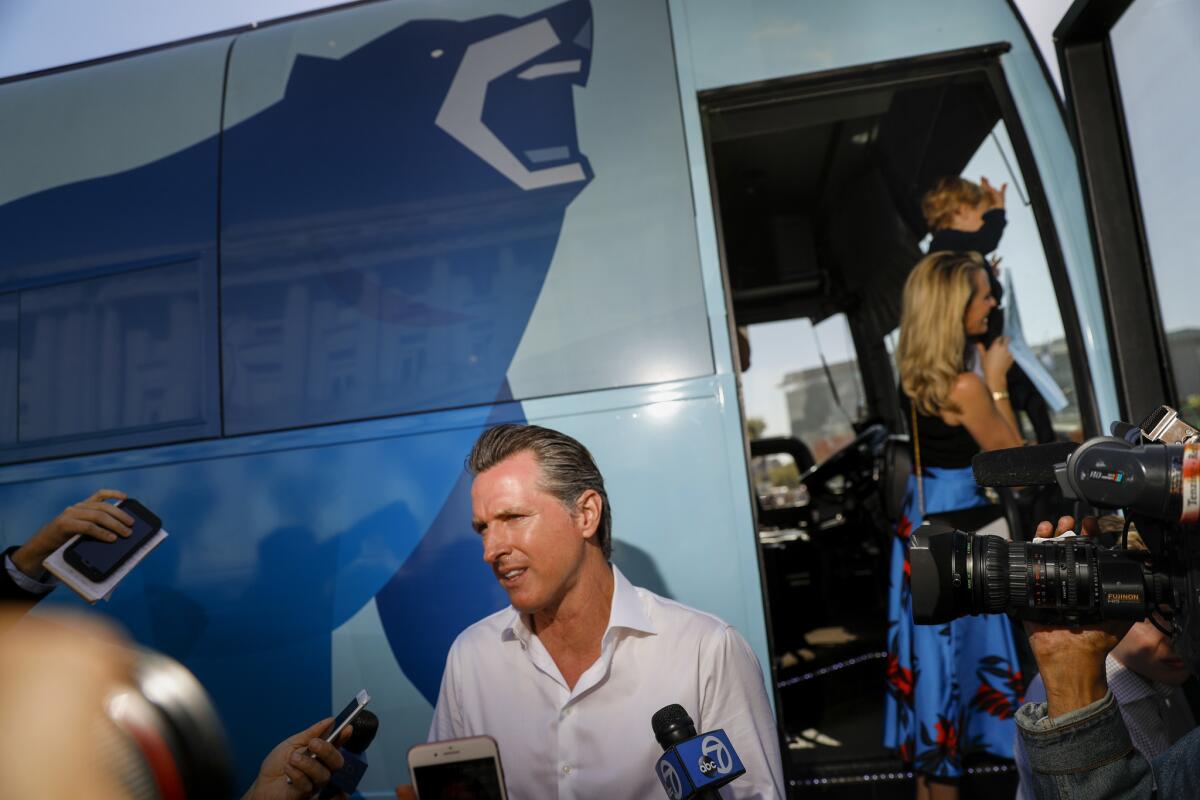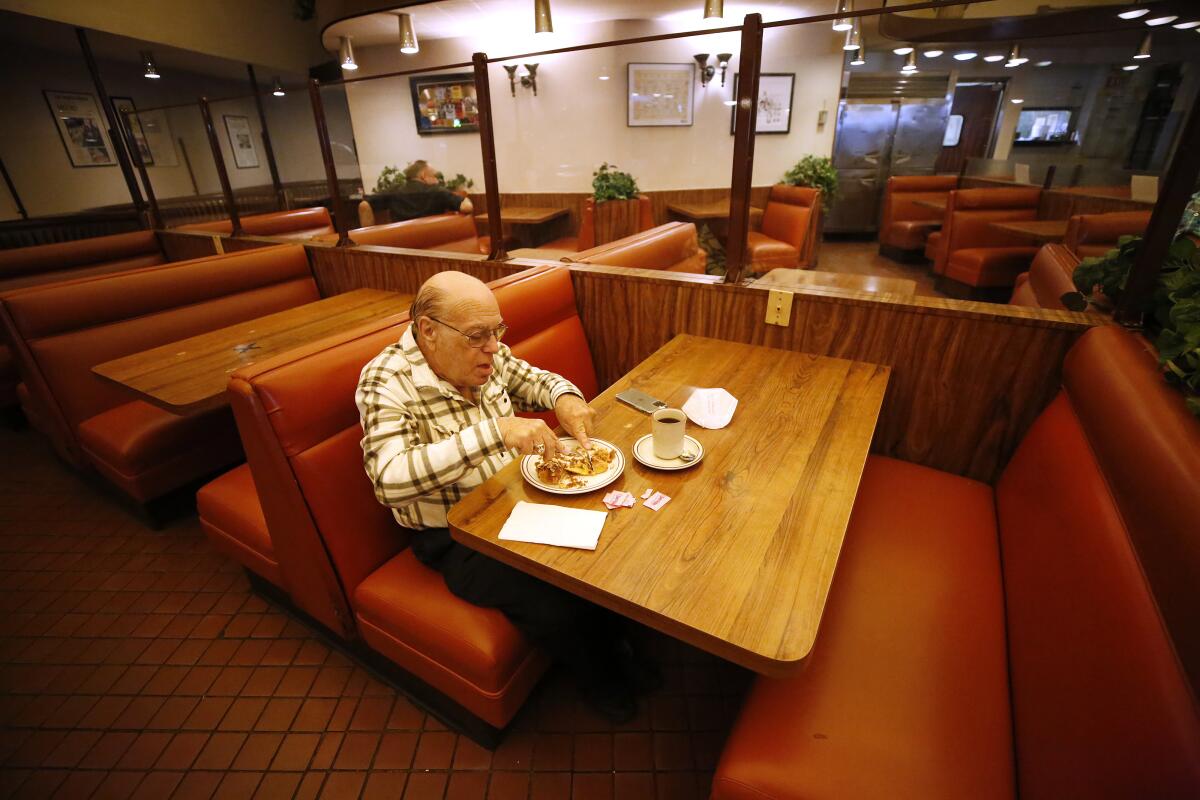Essential California: Newsom enters campaign mode

- Share via
Good morning, and welcome to the Essential California newsletter. It’s Tuesday, March 16, and I’m writing from Los Angeles.
Sign up for Essential California
The most important California stories and recommendations in your inbox every morning.
You may occasionally receive promotional content from the Los Angeles Times.
For months, Gov. Gavin Newsom largely avoided acknowledging the growing campaign to recall him from office.
It was clear the administration and party establishment were starting to take things seriously by February, when COVID-19 press conferences started including effusive, campaign-style testimonials and President Biden weighed in in with support. But Newsom’s official posture still appeared to be one of oxygen deprivation, with the governor brushing off questions about it as a distraction and framing the topic as something he didn’t have time to think about while leading the state’s pandemic response.
My colleagues posited that Newsom’s prime-time State of the State address last week doubled as an unofficial launch pad for the governor’s campaign to keep his seat. But even against the campaign-like backdrop of Dodger Stadium, the references remained oblique. Newsom decried California critics “promoting partisan political power grabs with outdated prejudices,” but never actually said the word “recall.”
All of that changed Monday morning, as Newsom pledged to “fight” the recall effort, with the vocal support of a cadre of national Democratic leaders. The campaign is on, and the high-profile party troops have been rallied.
[Read the story: “Newsom won’t ‘take this recall attempt lying down’ as Democrats launch defense” in the Los Angeles Times]
Elizabeth Warren urged her followers to “have Gavin’s back.” New Jersey Sen. Cory Booker called defeating the recall “one of the most important priorities for Democrats this year.” Sen. Bernie Sanders of Vermont and Georgia’s Stacey Abrams also voiced their support, among others.
Along with the coalition of national leaders, the state party promised $250,000 for a campaign to defend Newsom.
As Sacramento bureau chief John Myers explained, the coordinated party effort “may signal a concession that the governor’s opponents have collected enough voter signatures to force a special election later this year.” (Supporters said they had gathered some 2 million signatures, more than the roughly 1.5 million needed to trigger a recall election, but local election officials will have until April 29 to complete their review of the signatures to determine how many are valid.)
The unified messaging was also clear across varied platforms, from surrogate tweets to a splashy new website and 30-second video spot: This is not just a recall effort, but a “Republican recall.” In deep-blue California, the Newsom team appears to be wagering that its best defense will depend on making those two words inextricably linked in the minds of California voters.
The anti-recall website decries not just a “Republican recall,” but one tied to former President Trump, far-right and extremist groups like QAnon and the Proud Boys, and the insurrectionists who stormed the Capitol on Jan. 6. Imagery of the Capitol attack quite literally plays on the anti-recall campaign site’s homepage. But the charges of extremist connections are far from baseless: A January Times investigation found that recall campaign leaders, seeking to capitalize on the darkening public mood, allied with radical and extreme elements early on to help collect signatures.
In a story published Monday morning before the anti-recall campaign apparatus went live, my prescient colleague John Myers wrote about the looming role the former president and longtime Newsom foe could play in a recall campaign.
“Make ‘recall’ synonymous with ‘Trump,’ the thinking goes, and the effort may fizzle,” he writes. But despite his airtime in the anti-recall campaign’s video spot, the former president has yet to actually comment on the effort, as John notes.
And now, here’s what’s happening across California:
Millions more Californians — including those with underlying health conditions and disabilities — became eligible for vaccines on Monday. Some of those seeking the vaccine are likely to face frustration because of limited supplies. At the same time, people are being asked to follow an honor system of sorts, signing up only if they truly qualify. Officials are urging California not to cheat and to avoid getting inoculated ahead of others on the priority list. Los Angeles Times
Note: Some of the sites we link to may limit the number of stories you can access without subscribing.
L.A. STORIES
After months of COVID-19 closures, Los Angeles County unlocked a significant portion of its battered business sector Monday, allowing in-restaurant dining, gym workouts, moviegoing and a host of other activities at indoor venues, albeit with restrictions. Los Angeles Times
More on reopenings:
- Restaurant workers are bracing for added risk as they resume shifts inside.
- What you need to know about gyms reopening across Southern California.
- LACMA sets a reopening date. Six new shows are lined up after year of closure.
- A year ago, Canter’s was laying off employees. Now, the deli has welcomed back regulars.

The heartbreaking L.A. story behind Oscar nominee “A Love Song for Latasha.” The 1991 slaying of 15-year-old Latasha Harlins was a flashpoint during L.A.’s 1992 unrest. The 19-minute documentary short focuses not on Harlins’ death, but who she was before that day in March 1991. Los Angeles Times
Do the Oscars still mean the same thing in 2021? We asked the best picture nominated producers. Los Angeles Times
Support our journalism
IMMIGRATION AND THE BORDER
Children are sleeping on mats in overcrowded border facilities: The Biden administration faces an urgent humanitarian challenge as it struggles to find space for a surge of migrant children and teenagers that is almost three times the level seen early last year. New York Times
POLITICS AND GOVERNMENT
Rep. Deb Haaland has been confirmed as the first Native American to serve in the president’s Cabinet. Haaland (D-N.M.) will lead the Interior Department, the branch of the federal government that has more involvement in tribes’ affairs than any other. Los Angeles Times
An East Palo Alto councilman who gave out tacos at a polling place was not electioneering, a judge has tentatively ruled. Mercury News
COPS, CRIME AND COURTS
A Fresno police officer joined a Proud Boys rally. Now, two Fresno City Council members are calling for an independent investigation into the officer’s involvement with the group. The Bee reports that the officer has previously said he reached a leadership level in the Proud Boys before leaving to start his own group. Fresno Bee
HEALTH AND THE ENVIRONMENT
The first case of the Brazilian coronavirus variant P.1 has been detected in California: A San Bernardino County resident tested positive for the variant, which is believed to be more contagious than the most common strain of the virus. Los Angeles Times
CALIFORNIA CULTURE
Hmong students celebrate Fresno Unified’s new deputy superintendent: Deputy superintendent Mao Misty Her’s new position will make her the highest-ranking Hmong public school official in the nation, according to the school district. The central San Joaquin Valley is home to one of the largest Hmong populations in the country. Fresno Bee
More hot air balloon launches, less privacy? In scenic wine country, a local group is suing to overturn an increase in allowed hot air balloon launches. The group contends that the launch increase will allow thousands more balloon passengers to fly low over homes, which they call “the unlawful invasion of privacy rights.” Napa Valley Register
A poem to start your Tuesday: “Protection” by Sarah Gambito. Poets.org
Free online games
Get our free daily crossword puzzle, sudoku, word search and arcade games in our new game center at latimes.com/games.
CALIFORNIA ALMANAC
Los Angeles: sunny, 63. San Diego: sunny, 61. San Francisco: sunny, 55. San Jose: sunny, 61. Fresno: sunny, 57. Sacramento: still sunny, 61.
AND FINALLY
Today’s California memory comes from Lydia Burciaga Lostaunau:
Sunday drives were a family ritual. After church, we would sit down to a big lunch and then head out onto Kern County’s rural roads to find an adventure. Around Easter, the hills were covered with poppies, and dad would say, “Let’s stop and pick some oranges.” We believed him because we thought my dad knew everything about the world. At least that’s what he told us constantly. Our Sunday rides continued for all the years we were growing up. We found places to picnic along creeks and my dad and brothers would try their hand at fishing. During the winter, we drove to Tehachapi and made snowmen.
If you have a memory or story about the Golden State, share it with us. (Please keep your story to 100 words.)
Please let us know what we can do to make this newsletter more useful to you. Send comments, complaints, ideas and unrelated book recommendations to Julia Wick. Follow her on Twitter @Sherlyholmes.
Sign up for Essential California
The most important California stories and recommendations in your inbox every morning.
You may occasionally receive promotional content from the Los Angeles Times.







